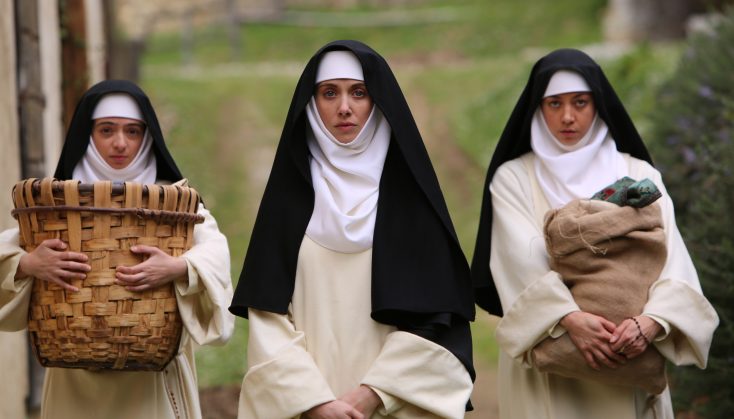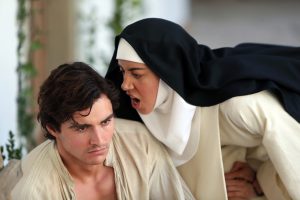By ANGELA DAWSON
Front Row Features
HOLLYWOOD—Dave Franco and Aubrey Plaza are two of Hollywood’s most notorious scene-stealers, and they just happen to co-star in the irreverent comedy “The Little Hours.”
Loosely based on Giovanni Boccaccio’s “The Decameron,” “The Little Hours” centers on three medieval nuns Fernanda (Plaza), Alessandra (Alison Brie) and Ginevra (Kate Micucci) who lead a simple life in their rustic Italian 14th century convent. Their days are spent chafing at the monastic routine, spying on one another and berating the estate’s caretaker. After a particularly vicious insult session drives the handyman away, Father Tommasso (John C. Reilly) brings on new hand in Massetto (Franco), a virile young servant forced into hiding after he is caught in bed with the lady of the house. Jeff Baena (“Life After Beth,” writer of “I Heart Huckabees”) directs and adapted the 700-year-old classic work for the screen.
Introduced to the sisters as a deaf-mute to discourage temptation, Massetto struggles to maintain his cover as the repressed young nuns begin to indulge in pansexual horniness, substance abuse and wicked revelry.
TV viewers may recall Plaza as the oddball civil servant April Ludgate on the NBC comedy “Parks and Recreation.” She also had a recurring role on the short-lived NBC sitcom “Welcome to Sweden.” On the big screen, she starred in the raunchy coming-of-age comedy, “The To-Do List,” in which she played a repressed high school grad determined to explore her sexuality. The Delaware native also starred in the “Big Chill”-ish “About Alex” and Baena’s zom-rom-com “Life After Beth.”
Franco appeared as a naughty frat boy in the “Neighbors” comedies, upstaging the fellow funnymen Seth Rogen and Zac Efron and delivering a spot-on impersonation of Robert De Niro. He also appeared in the rom-com-zombie movie “Warm Bodies” and appeared as an illusionist heist team in the “Now You See Me” films.
Plaza, known for her deadpan delivery, hails from Wilmington, Del., where she and her two younger sisters attended an all-girls Catholic school, while Franco, 32, grew up (along with his actor/writer/artist older brothers James and Tom) in Palo Alto, Calif., and is married to co-star Brie (“Mad Men”) The duo spoke about co-starring in the ribald update, in which they and the others actors were directed to come up with their own dialogue.
Q: What drew you into this project, because it’s very unusual? Jeff Baena has said he doesn’t want it to be pigeonholed as a comedy.
Plaza: I just loved the idea of doing a period comedy. For me, that’s just such a fun world to play in and it’s rare that people want to make movies like that, so just the general idea of it was so appealing to me. And the characters are so fun, especially the female characters. The nuns, all of them, had such layered personalities and journeys and motivations, and it felt like a really fun opportunity to play around.
Franco: I was drawn to the originality of the story and Jeff’s approach to it. You’ve never seen a movie with this tone. I don’t even know how to describe what the tone of this movie is, but I love that about it. Everything that’s being made these days is a remake or a sequel and so it feels good to be a part of something that’s trying to bring something new to the table. When you sit down with Jeff, the director, just for a few minutes, you immediately recognize that he sees the world in a different way and he’s got his own very specific voice, and I just wanted to get on the journey with him and see what happened.
Q: Aubrey, you were raised Catholic, right?
Plaza: Yeah.
Q: Did you attend Catholic school with nuns?
Plaza: Yeah, I went to a school called Ursuline Academy, which is an all-girls Catholic school with nuns. My school had a convent attached to the school on the campus. My first job ever was in the convent, actually. My first professional paycheck came from that convent. I was the portress, which is like the convent receptionist. So yeah, all of that world is very familiar to me.
Q: Were there, perhaps not as extreme as the nuns in this, but were there some little off, different sorts?
Plaza: Our nuns, a lot of them were really old and really just very old and sweet and they drove Buicks and they had a bunch of Buicks lined up in a row. I remember that. There was one nun that I interacted with the most and she was more kind of like a teacher. Some of them taught, but Sister Betty, she didn’t wear a habit and she played the guitar, so I got a lot of variation on what nuns can be like.
Q: Were you guys aware of the Decameron?
Franco: Yeah, it was talked about, something that you shouldn’t read?
Plaza: Oh, yeah. It was talked about but we would never read it.
Q: Dave, did you go to Catholic school?
Franco: No, I went to public school.
Q: Your director Jeff Baena was pretty clear about the actual Boccaccio Decameron being the inspiration, but did anybody talk about or look at the Pier Paulo Pasolini 1971 version of the “Decameron” at any time during pre-production?
Franco: I watched it, just to see how they portrayed it, but obviously it’s just such a different energy and tone and overall feel and Jeff again, he just wanted to put his own stamp on our movie and really have it stand apart. I don’t think he would say he was really influenced much by that film.
Plaza: Yeah. I saw the Pasolini version in college, but I didn’t re-watch it when we were shooting. I did try to listen to the Decameron on tape. I was like, “Maybe that will be a good thing to just get me going,” but the language was so flowery that after a while I was like, “I’m turning this off. I can’t. It’s just too much.”
Franco: Each story is very short, like 10 minutes.
Plaza: Well, I got through about one minute. I’m like, “Next.”
Q: How much did it help you guys in order to immerse you in this time to go to Tuscany and film this completely away from everything and just be able to focus on the film itself?
Franco: I think that was really important. I don’t think you can try to recreate that scenery anywhere else. We had to be there to really make it feel authentic and I mean more than anything, it was impossible to make the movie look ugly. Everywhere you pointed the camera it was the most beautiful thing you’ve ever seen. And then you add our costumes into the mix and it really kind of, yeah, made us feel immersed in it.
Plaza: Yeah, it was great. We were shooting in an actual, medieval convent from the time period that the movie is set in, so all of that I think was helpful, even if we didn’t realize it. Just walking through those halls and being in those rooms when we weren’t shooting and sitting in the gardens and it was very peaceful.
Q: Anything stand out for either of you as the biggest challenge of this? What was the toughest thing to get right?
Plaza: I would say just the improvised nature of the film was challenging for me. Jeff had such a specific idea of what the movie was and what each scene was, and so you just had to really trust in him, that he knew where it was going, and kind of let go a little bit, so it was challenging but really rewarding at the same time, I guess.
Franco: Yeah, the fact that there wasn’t a script was terrifying. You’re flying halfway across the world. You’re like, “I don’t even know what we’re getting into exactly.” But once we started, I realized it’s also very freeing and it’s nice to just show up to set and honestly not have to do a lot of homework and just be there and be present with the other actors.
Q: The lines and the delivery frankly of them are so funny and so sharp and I know Jeff wanted things to sound like modern colloquial without going too far into Valley Girl, but most of that, you were making up your own dialogue as you went along?
Plaza: We made up all the dialogue.
Q: Really?
Plaza: Yeah. We shot out of order, so there were a lot of times that we would have to really rely on Jeff. Sometimes he would suggest dialogue to us. It was somewhere in the middle of improv and scripted, but mostly all of the lines were improvised.
Q: The lines seem very consistent to each character and you all seem to be from the same culture.
Plaza: That’s all Jeff. We had rules about words we couldn’t say.
Franco: Yeah, the main rules were just don’t use any slang.
Plaza: You couldn’t say “cool.” You couldn’t say “like.” There were certain words you couldn’t use.






